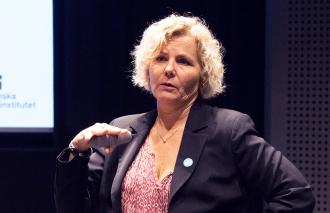“If women aren’t seen as significant in film, then they aren’t seen as significant in society,” Anna Serner said.
Serner, the CEO of the Swedish Film Institute, spoke about her “50/50 by 2020” initiative — which calls for equal gender representation and female leadership in the Swedish film industry by 2020— in a small, intimate conference room at the Berkeley Art Museum and Pacific Film Archive on Friday. Serner asked everyone present to introduce themselves to one another before she began her speech, in an effort to create a welcome environment where people could debate her ideas.
Serner attended film school in Sweden, where she was denied projects and constantly overlooked in favor of less qualified men. The sexism she experienced turned her away from the film industry, and she spent time as a lawyer until being offered her current position at the Swedish Film Institute. Now, she says that the men who discriminated against her at school are the ones trying to get in touch with her.
Her position is as relevant as ever, Serner explained, in light of the #MeToo movement that has swept Hollywood in recent months. She said that in 2013, only 34 percent of Swedish films passed the Bechdel test — an unacceptable number.
As a female executive, Serner has experienced plenty of sexism in the workplace. She recalled being appointed as CEO of the Advertising Association of Sweden when she was 34 — a staggering accomplishment in itself. However, instead of being congratulated for her promotion, she received endless comments, questioning how she could take on such a big responsibility and raise her children at the same time.
She saw a unique opportunity to change the experience for other women who wanted to enter the film industry. A crucial goal of Serner’s was to “define quality in a new way” — that is, emphasize and fund stories that are relevant, original and skillfully crafted. “Shit hits the fan pretty fast”, explained Serner, “(It’s) provocative to say we need to make a change.”
Serner was offered an opportunity to take a 40-60 initiative that would be immediately implemented through quotas. However, Serner elected to take a slower, but more rewarding route. 50-50 by 2020 is more long-term goal, but Serner hopes to get there without the help of quotas. Serner explained that quotas would not have the same emphasis on quality. Achieving gender equality is more important than just “ticking off boxes,” she said.
In order to achieve her goal, Serner laid out some actionable plans. To combat the commonly held belief that there are no competent women in film, Serner points to the website Nordic Women in Film, an archive of notable women in the Swedish film industry. Women in Swedish film history are often overlooked by men, and therefore information about them is scarce and hard to find without specialized resources. These kinds of archives are easy to create and can be a huge benefit to women who aren’t seeing themselves represented in film history.
Serner also set up various mentorship groups to help women avoid career pitfalls and roadblocks — the same ones that she experienced as a film student, being the only woman in the room. With a support system, women can share advice and encourage each other to keep fighting through the system.
Support for Serner’s work has, until recently, been met with scorn and derision from men in the Swedish film industry. Serner described her uphill battles at various board meetings and film festivals where her ideas and initiatives were not taken seriously. When the #MeToo movement picked up, however, the attitude towards Serner’s work quickly changed.
Now, Serner’s Instagram is flooded with positive comments, and she gets overwhelming applause at the film festivals she attends.
Serner’s goal is to slowly, but completely, change a system that doesn’t give women the right tools to succeed — a system that makes snap judgements when they fail. Serner is comfortable with fluctuations. She expects some failure, and she remains hesitant to celebrate too early. Serner ended her speech by warning the audience not to be too complacent in light of recent progress — “We all have to take steps after #MeToo.”
Contact Jasmine Garnett at jgarnett@dailycal.org.
